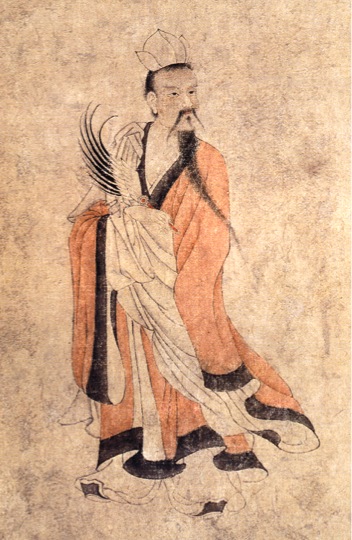The Song of Tea

Lu Tong (790–835)
Writing in Haste to Thank Imperial Grand Master of Admonishment Meng for Sending New Tea
The sun is as high as a ten-foot measure and five, and I am deep asleep.
The general bangs at the gate loud enough to scare the Duke of Zhou!
He announces that the Grand Master sends a letter, the white silk cover is triple-stamped.
Breaking the vermilion seals, I imagine the Grand Master himself inspecting these three hundred moon-
shaped tea cakes.
He heard in the New Year that they entered the mountain, startling the hibernating insects that rise
on the spring winds.
The Emperor must be the first to taste Yangxian tea. Until then, the one hundred plants dare not
bloom.
Benevolent breezes intimately embrace pearly tea buds, the early Spring coaxing out sprouts of golden
yellow.
Picked fresh, fired till fragrant, then packed and sealed; tea’s essence and goodness is not wasted.
Such venerable tea is meant for princes and nobles. How could it reach the hut of this mountain
hermit?
Shutting the brushwood gate against vulgar visitors, donning my gauze cap, I simmer and taste tea in
solitude.
Jade green clouds draw a steady wind, gleaming white froth gathers on the side of the bowl.
The first bowl moistens my lips and throat.
The second bowl banishes my loneliness and melancholy.
The third bowl penetrates my impoverished core, wherein are only the five thousand canonic scrolls.
The fourth bowl raises a light perspiration, all life’s inequities dispel through my pores.
The fifth bowl purifies my flesh and bones.
The sixth bowl leads me to the Immortals.
The seventh bowl I cannot drink, feeling only a pure wind rising beneath my wings.
Where is Mount Penglai, the Isle of Immortals?
I, Master Jade Stream, ride the pure wind, wishing to return.
Gathered on the mountaintops, the Immortals oversee the earthly realm,
High and lofty, removed from wind and rain.
Do they know the bitter lives of the myriad peasants toiling below the cliffs?
Thus, I ask the Grand Master about these common folk.
Whether or not, in the end, they will ever rest.
盧仝
走筆謝孟諫議寄新茶
日高丈五睡正濃,軍將打門驚周公。口云諫議送書信,
白絹斜封三道印。開緘宛見諫議面,手閱月團三百片。
聞道新年入山裏,蟄蟲驚動春風起。天子須嘗陽羨茶,
百草不敢先開花。仁風暗結珠琲瓃,先春抽出黃金芽。
摘鮮焙芳旋封裹,至精至好且不奢。至尊之餘合王公,
何事便到山人家。柴門反關無俗客,紗帽籠頭自煎吃。
碧雲引風吹不斷,白花浮光凝碗面。
一碗喉吻潤,兩碗破孤悶。三碗搜枯腸,唯有文字五千卷。四碗發輕汗,
平生不平事,盡向毛孔散。五碗肌骨清,六碗通仙靈。
七碗吃不得也,唯覺兩腋習習清風生。蓬萊山,在何處。
玉川子,乘此清風欲歸去。山上群仙司下土,
地位清高隔風雨。安得知百萬億蒼生命,
墮在巔崖受辛苦。便為諫議問蒼生,到頭還得蘇息否。
Source
Yuding quan Tangshi 御定全唐詩 (Imperially Commissioned Complete Poetry of the Tang Dynasty), juan 388, pp. 4a–5a.
Figure
Artist unknown
Portrait of Tao Hongjing as a Daoist, detail
Yuan dynasty, 14th century
Album leaf: ink and color on paper
National Palace Museum, Taipei

